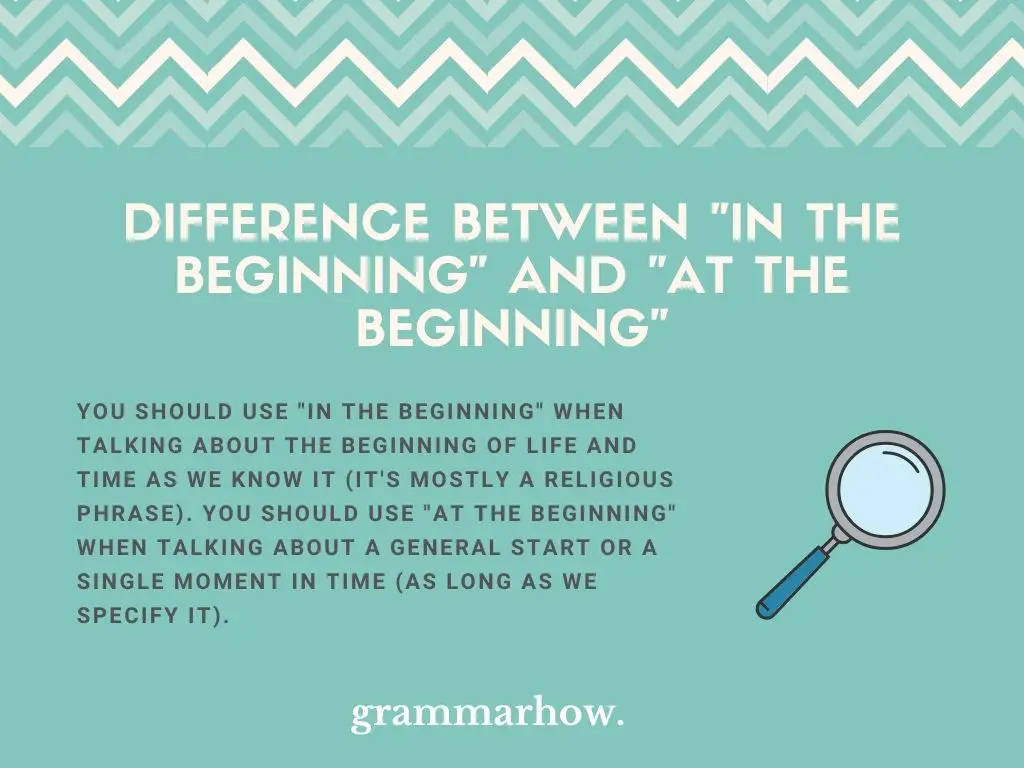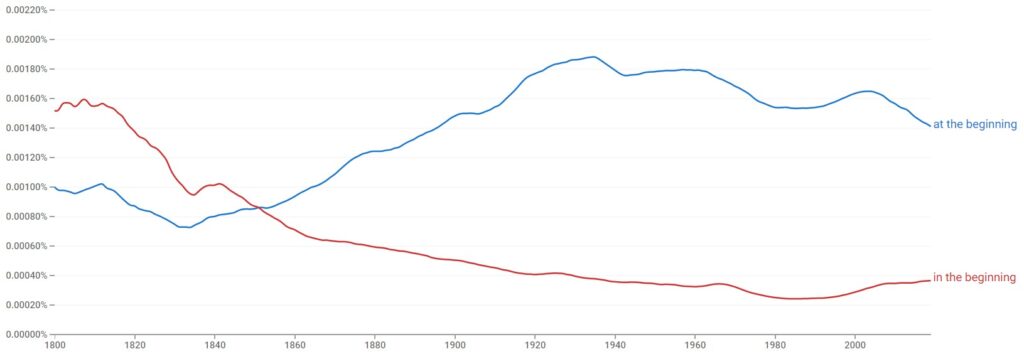- At the beginning / in the beginning
- What Is The Difference Between “In The Beginning” And “At The Beginning”?
- Examples Of How To Use “In The Beginning” In A Sentence
- Examples Of How To Use “At The Beginning” In A Sentence
- “In The Beginning” And “At The Beginning” – Synonyms
- “At The Beginning Of The Year” Or “In The Beginning Of The Year”?
- “In The Beginning Of Next Week” Or “At The Beginning Of Next Week”?
- WME
- Made of / made from
- At school / in school / in the school
- Afraid to / afraid of
- Arrive in / arrive at
- On time / in time
- Work at / work for / work in / work on / work with / work out
- Made of / made with / made by
- Interested in / interested to
- At the end / in the end
At the beginning / in the beginning
At the beginning of the century.
In the beginning of the century.
How to clearly distinguish when to use at, or in?
39 gold badges305 silver badges399 bronze badges
asked Oct 8, 2010 at 9:39
In general, «at» marks a spot and «in» marks a space. Obviously, there are idiomatic exceptions, but this really isn’t one. The beginning of a period of time is a «spot», the period of time itself is rather «spacious».
answered Oct 8, 2010 at 10:44
2 gold badges22 silver badges20 bronze badges
To answer the question: I would never say «in the beginning of the century». I think Peter Eisentraut’s argument is essentially correct: «the beginning of the century» is notionally a point, not a period (even though in practice, «at the beginning of the century» may in context cover a period of several years).
In fact the only instance I can think of of «in the beginning» is the opening of St. John’s Gospel. That phrase is now archaic, and would not be used except in imitation of that specific use.

9 gold badges140 silver badges210 bronze badges
answered Oct 8, 2010 at 14:43

1 gold badge94 silver badges196 bronze badges
«In the beginning» as a collocation does not take a referent — it refers to some (contextually defined) absolute start (the beginning of the story, the creation of the world, etc.). It is familiar as the opening words of Genesis and of the gospel of John in the King James Bible.
answered Oct 8, 2010 at 22:55
I have read and heard both of these ..
But I found this sentence in a book which says to change «in» into «at»
«In the beginning of his carrier, he did some commercials. «
What’s the difference ??
someone explain to me..
Thanks in advance..
Hi, SG. It’s pretty common to use «at» before the phrase «the beginning», but «in» is also possible. Because «the beginning of his career» is a brief period of time, I’d probably use «at» instead of «in». I think the book’s suggestion is reasonable.
It may help you to remember that «at» is a preposition that is frequently used before «beginning» and «end»: I didn’t like the scene at the end of the movie. I want you to start over at the beginning.
Either preposition would be acceptable. «At» perhaps suggests at the very beginning.
I’m sure the threads that come up in the search of»beginning in at» contain nuances that can be found. One discriminator might be whether the word beginning is used to define an instant or a period of time (the first part of a longer event or work) where collocations may differ on that specific basis.
Yes, you can see some sense in «in the beginning» = «within the first part of the events» and «at the beginning» where «the beginning» is the first instant.
But «beginning» is intrinsically informal and thus the apparent carelessness (or lack of pedantry) that gives rise to a common use.
I note that
«In the beginning we found it difficult.» sounds OK, as does «At the beginning we found it difficult.»
but
«In the beginning of the course we found it difficult.» sounds awful and I would mark it wrong,
Yet
«At the beginning of the course we found it difficult.» is OK.
At is the safe option.
If you really want to play it safe:
Are both expressions
- «At the beginning»
- «In the beginning»
valid and equivalent? The first «seems wrong» to me, but it has more Google results.
asked Apr 10, 2011 at 18:52
They are valid but not interchangeable. I think the most important difference is that «in the beginning» seems to be an expression describing a whole period of time, while «at the beginning» more literally describes a single moment in time, similar to the difference between saying «in the morning» and «at 8 a.m.»
Compare your question to «in the end» versus «at the end.» «In the end» is an idiom synonymous with «ultimately.» There’s a clear distinction. I think the same can be said for «in the beginning»/»at the beginning.»
answered Apr 10, 2011 at 20:46
1 gold badge11 silver badges10 bronze badges
«In the beginning» are the three words that open the Book of Genesis in the Bible. For Christians, the phrase conveys that additional sense of an origination.
«At the beginning» by itself just sounds incomplete to my ear. At the beginning of what?
answered Apr 10, 2011 at 19:11
11 silver badges9 bronze badges
Personally, it seems to me that «in the beginning» refers to time and «at the beginning» refers to placement.
Often they might be casually interchanged with a figurative allusion to the other meaning.
For most uses, I think using ‘at’ sounds better and I’d be more likely to use it, whether according to what I wrote here or less pedantically.
answered Apr 10, 2011 at 21:46
2 silver badges8 bronze badges
answered Apr 9, 2016 at 3:23
1 silver badge1 bronze badge
These are all fine and unremarkable.
answered Apr 10, 2011 at 19:26
39 gold badges359 silver badges596 bronze badges
answered Apr 11, 2011 at 5:47
While prepositions like “at” and “in” are small words, that doesn’t stop them from having a profound impact on the overall meaning of a phrase. This article will examine the differences between “in the beginning” and “at the beginning” and which one you should use.
What Is The Difference Between “In The Beginning” And “At The Beginning”?
You should use “in the beginning” when talking about the beginning of life and time as we know it (it’s mostly a religious phrase). You should use “at the beginning” when talking about a general start or a single moment in time (as long as we specify it).

Typically, people are more inclined to use “at the beginning.” We can also show you the differences between the two phrases by mixing them up slightly:
- In the morning
- At 7 o’clock
Here, we use “in” to describe “the morning,” which is the start of the day. This is the specified time period (the day), and the morning is “in the beginning” of the day.
We use “at” to describe the specific time, “7 o’clock.” This works because “at the beginning” simply describes a single time or general starting point, and if someone’s day starts at “7 o’clock,” then that would be the “beginning” to them.
It might help you to see which of the two phrases is used more often. That way, you’ll have a better understanding of which preposition is more likely to come up.
According to Google Ngram Viewer, “at the beginning” is by far the most popular choice of prepositions. It’s used more because it refers to more general times, while “in the beginning” seems only to refer to the specific beginning of the universe or the world.

Examples Of How To Use “In The Beginning” In A Sentence
“In the beginning” is mostly found in religious contexts. It refers to their being an origin of time in some way, like how God might have created the world and everyone in it “in the beginning.”
Some examples might help you to understand when it works best:
- In the beginning, there was nothing but trees.
- In the beginning, there wasn’t much for anyone to do.
- In the beginning, we found it hard to come up with new innovations because we weren’t granted that power.
- In the beginning, there was nothing to do except survive.
- In the beginning, people struggled for food and water.
“In the beginning” works only to talk about the dawn of time (or some other specified time period). It mostly works in religious texts because they believe that there was a timeline for the creation of humankind and the Earth.
Examples Of How To Use “At The Beginning” In A Sentence
- At the beginning of my day, I always make sure to drink five egg whites.
- At the beginning of the workday, people always greet me with a smile.
- At the beginning of the week, I’m always happy to go to work.
- At the beginning of the movie, I had a hard time concentrating.
- At the beginning of the fair, my girlfriend got lost, and I spent the whole time trying to search for her.
“At the beginning” usually comes with a time frame after it, like “of the day” or “of the week.” This helps us to specify the beginning of the current time frame that we’re working with.
It’s not common to see this:
Even if the context is clear, we generally don’t write in this way. “At the beginning” doesn’t work as a standalone clause, so we must try to specify what the time frame we’re talking about is:
“In The Beginning” And “At The Beginning” – Synonyms
- To begin with
- At the start
- To start with
- In the first place
- Originally
- Earlier
- At first
- First
- From day one
- From the word “go”
All of these synonyms work in place of either “in the beginning” or “at the beginning.” We use them to talk about things that have happened for as long as we are able to remember them.
“At The Beginning Of The Year” Or “In The Beginning Of The Year”?
We’ve specified now “at the beginning” and “in the beginning” work now, so these next few sections should be easier to deal with.
“At the beginning of the year” is correct because we specify the time period with “of the year.” When writing “at the beginning,” we always need to specify the time period.
“In the beginning of the year” is wrong because we can’t use “in” with a time frame like this. “In the beginning” only works when talking about the entire time frame of the Earth.
“In The Beginning Of Next Week” Or “At The Beginning Of Next Week”?
The same rules apply when we look at these examples. There is only one choice that is correct.
“At the beginning of next week” is correct because “of next week” helps us to specify the exact time we’re beginning with. We do not use “in the beginning” when we’re also specifying a more specific time frame.
- Correct: I’m going to have to look into this at the beginning of next week.
- Incorrect: I will make sure to do that in the beginning of next week.

Would you please tell me when should I use «IN the beginning» or «AT the beginning» ?
Thank you in advance,
Hela
You’ve asked a very good question, Hela! It’s so good that I’m not sure I have a good answer for you. After thinking about this for a while, I’ve come to some tentative conclusions:
1. «In the beginning» are the first 3 words of many English translations of the Hebrew Old Testament; therefore, because for many English speakers, they resonate with religiosity, they are used less often than «at the beginning.»
2. In the phrase, «let’s begin —- the beginning,» AT appears to be almost universally used.
3. If a speaker or a writers uses «at the end,» then they are much more likely to use «AT the beginning» in contrast. Similarly, if the person uses «in the end,» «in the beginning» will appear as the contrasting phrase.
Otherwise, I’d say the phrases are used interchangeably by most AE speakers/writers. I’d be interested in hearing what other native speakers think, however.
Hope this helps a little bit.
Hi Hela,
well, I’m no expert (I’m new to this forum), but I think that «at the beginning» implies a reference to a more specific point in time, where as «in the beginning» implies something occuring over a slightly longer period of time. They are often interchangeable, though. One example that’s almost always «at» instead of «in» is the phrase «Start at the beginning.»
I’ll be interested to hear what others have to say.
all the best
I also reckon that Joelline is right about the reason for in the beginning being used less often. People will happily talk about in the end, or at the end (with the difference suggested already for the beginning), but in the beginning seems to me to be uncommon in normal use.
The Oxford Learner’s Dictionary has an interesting usage note:
At the beginning (of) is used for the time and place when something begins. In the beginning (= at first) suggests a contrast with a later situation
However the Cambridge Dictionary has an example where «at/in» are shown to be interchangeable in the «contrast» sense:
I enjoyed my job at/in the beginning but I’m bored with it now
Thank you all very much
Is there a difference between ‘in the beginning’ and ‘at the beginning’?
One of my students wrote:
In the beginning we will discuss if it is really necessary to develop a new product.
Shouldn’t it be At the beginning?
In the beginning means at first and At the beginning means where something starts. Thus, I’d say that neither version is correct inthe excerpt you provided. I second sharkey’s opinion, To begin with is the best option here.
In the beginning god created man
Oh no he didn’t!
In the beginning God created the heavens and the earth.
oh yes he didn’t create man first
just testing your knowledge of the bible
Thank you for all your very helpful answers. It is so hard being an English teach without being a native speaker and all your answers are very much appreciated.
The reference to the bible was very helpful, too.
Is it better to say «at the beginning of the chapter» or «in the beginning of the chapter»?
Post mod (English Only / Latin)
Welcome to the forum, NativeRussian!
I think it may depend on what you are talking about.
Could you tell us the rest of the sentence? Are you talking about the writing style, or the content, or something else?
Hello
What is the difference between at the begining and in the begining?
At the beginning of the book there is the book’s title — This is the very start of the book — the first words of the story
In the beginning of the book, the hero is trapped but escapes and makes his way to Cairo. — this describes the first things that happen in the book.
Thanks for these explanations, it is very helpful.
(I run into this sentence, and googling, I came to this thread) .
According to all the above-mentioned proposals and explanations, yes!
Which one is correct?
1. «In the beginning of the process, flour is mixed with sugar in a machine for about 5 minutes.»
2. «At the beginning of the process, flour is mixed with sugar in a machine for about 5 minutes.»
This is quite similar to the perception of «a time» in this post, which could be perceived as a period or a point in time.
Hi, this is my first post in WR. I think that, «in the beginning» refers to something general like «at first or in the first moment». On the other hand, «at the beginning» refers to the beginning of something:
In the beginning I didn’t really enjoy the course, but after a while I really started to enjoy it.
At the beginning of the film the main character arrives in town looking for somewhere to stay.
I hope it helped
Taken from: Linking words and expressions to express time
Actually, the reverse is true. For example,
«In the beginning, the book describes the hardship the main character is facing.»
«In» refers to the content of which the book consists. «At the beginning» refers to the time that something starts.
It was raining in/at the beginning, but after a while, it stopped and we left for the supermarket.
WME
Do you see any difference between these two in usage?
If so, what difference ?
Thanks for your kind input
Say two people attended some lecture and one of them missed something. Which do I pick?
A: Looks like he didn’t mention the deadline for our project.
B: Well, he did. It’s 13 October.
A: Oh, that’s interesting. I must have missed that. When did he mention it?
B: At the very beginning. / In the very beginning.
At the very beginning = when the lecture started.
In the very beginning = when the universe started. The cosmic beginning.
After reading all the above explanations, I’m still unsure about the difference between «in the beginning» and «at the beginning».
e.g. You should mention the benefits of team sports in/at the beginning of the article.
Based on the explanations above, I’d think «at» is needed, but a friend of mine who speaks much better English than I do and who lives in the US said «in» was correct.
I think only “at’ works here.
Made of / made from
MADE OF — если материал, из которого что-то изготовлено не поменялся и остался таким же, как и был до использования.
Кирпичи были кирпичами и до того, как из них сделали дом. Они остались неизменными и после того, как из них построили дом. В общем, кирпич он и в Африке кирпич.
MADE FROM — если материал претерпел изменения, был подвержен или трансформирован в процессе изготовления чего-либо.
Дерево прежде, чем стать бумагой проходит множество путей обработки, наши тетрадки не состоят из стволов и веточек, мы имеем перед собой уже гладкий белый лист. Догадаться, что он когда-то был деревом сложно.
- This shirt is made of cotton. Эта футболка изготовлена из хлопка.
- The keyboard I use on my computer is made of plastic. Клавиатура от моего компьютера сделана из пластмассы.
- Wine is made from grapes. Вино сделано из винограда.
- This cake is made from all natural ingredients. Этот торт сделан из натуральных ингридиентов.
At school / in school / in the school
Обратите внимание, что это правило касается не только английского слова школа, но и всех других общественных заведений, таких как:
- In hospital / at hospital (на лечении) – in the hospital (в здании больницы)
- In theatre / at theatre (на спектакле) – in the theatre (в здании театра)
- In prison / at prison (в заключении) – in the prison (в здании тюрьмы)
Для начала разделим английский на американский и британский, Вы же знаете, что в этих странах английский немного отличается?
В британском варианте (который обычно преподают в школах и институтах) — если кто-то at school, тогда он находится в школьном возрасте, учится/ходит в школу.
- How is Julie these days? Has she started working? Как сейчас дела у Джули? Она начала работать?
- No, she’s still AT school. Нет, она ещё в школе.
Выражение in school редко можно услышать в британском английском — это скорее характерно для американского варианта.
in the school значит «находиться физически в здании школы, но необязательно на занятиях».
Американский английский
Если вы используете выражение in school, в американском варианте английского, то оно значит «ходить в школу целью обучения, быть в школьном возрасте».
- How is Julie these days? Has she started working? Как сейчас дела у Джули? Она начала работать?
- No, she’s still IN school. Нет, она ещё в школе.
А вот если вы используете at school, то вы физически в данный момент находитесь в школе.
- Hi, is David home at the moment? Привет, а Дэвид сейчас дома?
- No he’s at school, he should be home by 5 p.m. Нет, он в школе, он должен быть дома к 5-ти часам.
Если же вы находитесь в здании школы, но не обязательно на занятиях, то используйте in the school.
Afraid to / afraid of
AFRAID TO do — используется если делаем что-то намеренно, мы можем выбирать делать это или нет.
- I’m AFRAID TO DO somethingю. I don’t want to do it because it’s dangerous or the result could be bad. Я боюсь сделать что-то. Я не хочу этого делать, потому что это опасно, либо результат может быть плохим.
- This part of town is dangerous. People are afraid to walk here at night. Эта часть города опасна. Люди боятся гулять здесь по вечерам.
То есть они не хотят гулять, потому что это опасно. Они боятся это ДЕЛАТЬ.
AFRAID OF — используется если мы для этого ничего сами не делаем, это происходит случайно.
- I’m AFRAID OF something happenING. It is possible that something bad will happen. Я боюсь, что что-то произойдёт/случится. Вполне вероятно что случиться что-то плохое.
- The path was icy, so we walked very carefully. We were afraid of falling. Дорога была замерзшая, поэтому мы шли очень аккуратно. Мы боялись упасть.
То есть мы боялись, что может произойти падение из-за скользкой дороги. От нас не зависит.
Ещё один наглядный пример:
I was afraid to go near the dog because I was afraid of being bitten. Я боялся пройти рядом с собакой, потому что боялся, что она меня укусит.
То есть я боялся что-то СДЕЛАТЬ (afraid to), потому что плохое могло СЛУЧИТЬСЯ (afraid of).
Arrive in / arrive at
Глагол arrive используется только с предлогами in или at, и означает — приезжать.
ARRIVE IN — прибываем в города, страны, большие районы
- She arrived in the USA. Она приехала в США.
- My sister arrived in New York last night. Моя сестра приехала в Нью-Йорк прошлым вечером.
ARRIVE AT — прибываем к зданию, приезжаем в конкретное место
- I arrived at the airport. Я приехала в аэропорт.
- He arrived at your house. Он приехал к тебе домой.
Сказать, что вы идете/едете по направлению куда-то, можно также используя глаголы GO и COME, при этом используется предлог TO:
- My sister came to New York last night. Моя сестра прибыла в Нью-Йорк прошлой ночью.
- She went to the USA. Она приехала в США.
- I came to the airport. Я приехал в аэропорт.
- He came to your house. Он пришел к тебе домой.
On time / in time
На русский язык оба варианта переводятся одинаково «во время», но употребляются они по-разному:
- The plane took off on time. Самолет взлетел вовремя.
- Our English teacher comes on time. Наш преподаватель приходит вовремя.
- The doctor arrived in time to aid her. Доктор прибыл вовремя, чтобы помочь ей.
- You called me in time. Ты позвонил мне вовремя.
Work at / work for / work in / work on / work with / work out
WORK AT + место работы:
- Jack works AT a bank downtown. Джек работает в банке в центре города.
- She works AT school / the office. Она работает в школе / в офисе.
- The boss was working AT his desk all day. Начальник работал за столом весь день.
WORK FOR + название компании / человек (твой начальник):
- Jack works for NYC Finance downtown. Джек работает в «Нью Йорк Сити Файненс» в центре города.
- She works for «Google». Она работает в компании «Гугл».
- Teddy used to work for Jack Welch. Тедди раньше работал на Джека Уэлша.
WORK IN + сфера деятельности:
WORK ON + задание / задача:
- Jack works on finance reports for the bank. Джек работает над финансовыми отчетами для банка.
- I was working on my lessons all morning. Я работал над уроками все утро.
WORK WITH + приспособление (софт / программа) / человек (коллега) / часть тела:
- Jack works with a computer and a financial calculator. Джек работает с помощью компьютера и финансового калькулятора.
- I worked with Greg and Nobi in my previous job. Я работал с Грегом и Ноби на прошлой работе.
- Freddy is a plumber, so he works with his hands. Фредди водопроводчик, он работает руками.
WORK OUT — фразовый глагол, означающий «тренироваться».
- Danny works out at the health club on 53rd Street. Дэнни тренируется в спортзале на 53 улице.
- I need to start working out, but it is so difficult to get started! Мне нужно начать тренироваться, но так сложно начать!
Made of / made with / made by
MADE OF + материал изготовления
- This box is made OF wood. Эта коробка сделана из дерева.
- Most pens are made of plastic. Большинство ручек сделаны из пластика.
MADE WITH + ингредиенты приготовления
- This salad is made with tomatoes and cucumbers. Этот салат сделан из помидоров и огурцов.
- That lotion is made with aloe vera. Тот лосьон изготовлен из алоэ вера.
- This dish is made with garlic and oil . Это блюдо сделано из чеснока и масла.
MADE BY + способ/метод изготовления
- The noodles are made by hand. Лапша изготавливается вручную.
- The picture was made by a laser. Картина была сделана лазером.
Interested in / interested to
interested IN — I’m interested IN DOING something = I’m thinking of doing it, I would like to do it. Я подумываю над чем-то, я хотел бы это сделать.
- Let me know if you’re interested in joining the club. Дай мне знать, если ты заинтересован во вступлении в клуб / если хочешь вступить в клуб.
- I tried to sell my car, but nobody was interested in buying it. Я пытался продать свою машину, но никто не был заинтересован в ее покупке / никто не хотел ее покупать.
interested TO — I was interested TO DO something = it was interesting for me. Прямое значение — что-то именно интересно (узнать / услышать / прочитать / выучить).
- I was interested to hear it. Мне было интересно это услышать.
- Ask Mike for his opinion. I would be interested to know what he thinks. Спроси мнение Майка. Мне было бы интересно узнать, что он думает.
At the end / in the end
Также есть устойчивое выражение «at the end of the day», и означает оно тоже «в конце концов». Будьте внимательны!



